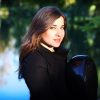
Airplane Diaries
Alisa Weilerstein
I think it’s appropriate that I’m writing my first blog (ever—not only on this site) while flying between Madrid and Copenhagen. I’ve taken to telling people I live on airplanes lately, which is sort of true since I catch up on sleep most often while I’m in the air, and I’ve only been in my actual apartment for four days so far this year.
I’ve been in Europe for a few days and for the first time in awhile am experiencing some serious transatlantic jetlag. I can’t sleep before 4:30 a.m. and waking up in the morning (in other words, when the sun is up…) has been difficult, to put it mildly. I just finished three concerts in Madrid, playing Osvaldo Golijov’s incredible Azul. Given my perpetually bleary-eyed state each one of them went surprisingly well.
In a sense I felt I had tapped into some other energy source that I’m normally perhaps too “present” to reach. I had heard stories of people playing fantastic concerts when they really had no right to do so—a story of a friend of mine who played one of the best concerts of his life with a fever of 104 degrees comes to mind–but I was convinced that I haven’t really been privy to such experiences myself. That is until I really started to think about this strange phenomenon, and suddenly remembered an extremely intense, almost out-of-body experience several years ago; the only time I’ve played in Australia. I went there for a three week tour playing Rococo Variations and Shostakovich 1st Concerto back in 2001. It took twenty hours in the air to get there from Vancouver, so needless to say I was completely turned around. My first concert was two days after I landed also, which in retrospect wasn’t the most practical planning in the world! I don’t remember every single detail of that concert, but I remember discovering colors and ideas that had previously eluded me, even in the rehearsals that preceded that concert. Then at the end of the third variation, things got very strange. Right after the mini-recitative moment, when it reaches the E Major arpeggios, I started to feel extraordinarily (and very pleasantly!) relaxed. I felt myself ascending those arpeggios as if in slow motion, my fingers moving entirely of their own accord, and when I reached the final arpeggio accompanied by those beautiful harmonics in the violins…I actually felt myself starting to dream! My eyes were closed on the final E in the stratosphere and I felt completely in character, like I was floating off the stage carried by some giant helium balloon. Then luckily reality kicked in and I snapped myself back out of my suspended, twilight-zone state to carry on. I finished the performance and no one mentioned my brief episode at all—the only comments I got that evening in fact were about how “inspired” the performance was. Given my state of mind at the time, I am obviously in no position to judge how the performance actually went, but it was one of the strongest reactions from an audience and orchestra that I’ve received for that piece, even to this day. Besides, I also really enjoyed the experience!!
So, where am I going with all this? Am I suggesting that we all try to mimic a jetlagged state to reach new heights while performing? Definitely not, but it certainly is making me reassess what actually goes on in one’s mind while onstage. So far I think the jetlagged state forced all unnecessary thought from my mind. I don’t normally have an issue with nerves, no matter what state I’m in. But I sometimes catch myself thinking of practical issues while onstage, issues that are appropriate to think about while learning and practicing a piece but really have no place onstage. I don’t want to think about the angle of my hand or shifting speed when I’m performing—ideally I want to feel completely spontaneous, as if any physical or technical decision is made purely because the music demands it in the moment. I think I came closer to reaching that feeling in Madrid this week and I enjoyed it immensely. My Australia experience was certainly extreme and a bit scary, but it was also one of the most enjoyable Rococos I’ve ever played. I’m going to land in Denmark soon, where I’m also playing Azul. Looking forward to more adventures onstage, jetlagged-induced and otherwise!
Subjects: Travel
Tags: adventure, adventures, air travel, Airplanes, Alisa, atmosphere, audiences, cello, cellobello, character, colors, concentration, control, energy, exhaustion, focus, health, ideas, inspiration, learning, orchestra, performance, practicing, reality, Rest, shifting, travel with an instrument, vibrato, Weilerstein
